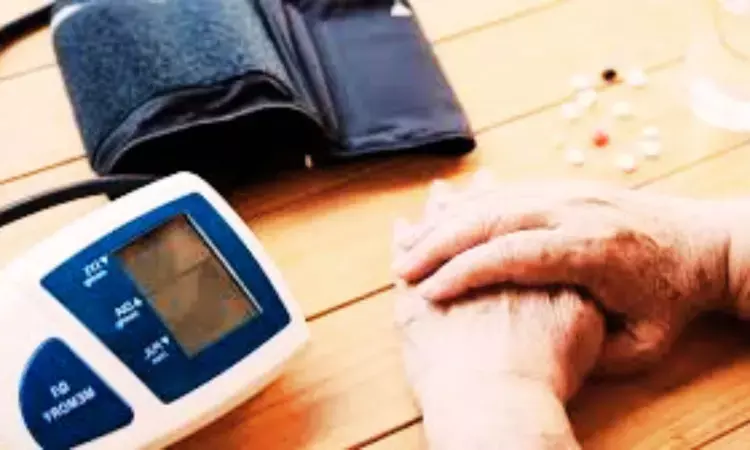- Home
- Medical news & Guidelines
- Anesthesiology
- Cardiology and CTVS
- Critical Care
- Dentistry
- Dermatology
- Diabetes and Endocrinology
- ENT
- Gastroenterology
- Medicine
- Nephrology
- Neurology
- Obstretics-Gynaecology
- Oncology
- Ophthalmology
- Orthopaedics
- Pediatrics-Neonatology
- Psychiatry
- Pulmonology
- Radiology
- Surgery
- Urology
- Laboratory Medicine
- Diet
- Nursing
- Paramedical
- Physiotherapy
- Health news
- Fact Check
- Bone Health Fact Check
- Brain Health Fact Check
- Cancer Related Fact Check
- Child Care Fact Check
- Dental and oral health fact check
- Diabetes and metabolic health fact check
- Diet and Nutrition Fact Check
- Eye and ENT Care Fact Check
- Fitness fact check
- Gut health fact check
- Heart health fact check
- Kidney health fact check
- Medical education fact check
- Men's health fact check
- Respiratory fact check
- Skin and hair care fact check
- Vaccine and Immunization fact check
- Women's health fact check
- AYUSH
- State News
- Andaman and Nicobar Islands
- Andhra Pradesh
- Arunachal Pradesh
- Assam
- Bihar
- Chandigarh
- Chattisgarh
- Dadra and Nagar Haveli
- Daman and Diu
- Delhi
- Goa
- Gujarat
- Haryana
- Himachal Pradesh
- Jammu & Kashmir
- Jharkhand
- Karnataka
- Kerala
- Ladakh
- Lakshadweep
- Madhya Pradesh
- Maharashtra
- Manipur
- Meghalaya
- Mizoram
- Nagaland
- Odisha
- Puducherry
- Punjab
- Rajasthan
- Sikkim
- Tamil Nadu
- Telangana
- Tripura
- Uttar Pradesh
- Uttrakhand
- West Bengal
- Medical Education
- Industry
Deprescribing Antihypertensives May Preserve Cognitive Function in Nursing Home Residents: JAMA

USA: Deprescribing antihypertensive medications may benefit elderly individuals in long-term care facilities by reducing the risk of cognitive decline, new data from the Veterans Health Administration has shown.
The study, published in JAMA Internal Medicine, revealed that elderly patients who had their blood pressure (BP) medications reduced—either by decreasing the overall number of drugs or adjusting dosages—experienced a slower rate of cognitive decline compared to those who continued their usual medication regimen. This effect was especially notable among patients with dementia.
Deprescribing antihypertensive medications is common among nursing home residents, but the relationship between this practice and cognitive decline remains unclear. To fill this knowledge gap, Bocheng Jing, Division of Geriatrics, Department of Medicine, University of California, San Francisco, and colleagues aimed to examine the relationship between deprescribing antihypertensive medications and changes in cognitive function among nursing home residents.
For this purpose, the researchers conducted a cohort study using a target trial emulation approach, including VA long-term care residents aged 65 and older who had been in residence for at least 12 weeks between 2006 and 2019. Residents not prescribed antihypertensive medications, those with blood pressure above 160/90 mm Hg, or those with heart failure were excluded. Eligible residents with stable medication use for four weeks were divided into deprescribing or stable user groups and followed for two years or until death or discharge, for intention-to-treat (ITT) analysis. Participants who switched treatment groups were censored in the per-protocol analysis.
Deprescribing was defined as a reduction in the total number of antihypertensive medications or a dosage decrease of 30% sustained for at least two weeks. Cognitive function was evaluated using the Cognitive Function Scale (CFS), categorized as cognitively intact (CFS = 1), mildly impaired (CFS = 2), moderately impaired (CFS = 3), and severely impaired (CFS = 4).
Follow-up data were analyzed using an ordinal generalized linear mixed model, adjusting for confounders with inverse probability of treatment weighting, and per-protocol analysis included the inverse probability of censoring weighting.
The following were the key findings of the study:
- Of 45,183 long-term care residents, 12,644 (mean age 77.7 years; 2.6% female, 97.4% male) qualified for intention-to-treat (ITT) analysis, while 12,053 (mean age 77.7 years; 2.6% female, 97.4% male) met the criteria for per-protocol analysis.
- At the end of the follow-up, 12.0% of residents showed a worsened Cognitive Function Scale (CFS) score, while 7.7% demonstrated improvement.
- Among the deprescribing group, 10.8% experienced a worsening CFS score compared to 12.1% in the stable user group.
- In the per-protocol analysis, the deprescribing group had a 12% lower likelihood of progressing to a worse CFS category every 12 weeks (odds ratio, 0.88) than the stable users.
- Among residents with dementia, deprescribing was linked to a 16% reduction in the odds of cognitive decline (odds ratio, 0.84). These trends were consistent in the ITT analysis.
This cohort study suggests that deprescribing is linked to reduced cognitive decline in nursing home residents, especially among those with dementia. The researchers suggest that additional data are necessary to fully understand the benefits and risks of antihypertensive deprescribing, which will help guide patient-centered medication management in nursing homes.
"These findings highlight the importance of patient-centered strategies for deprescribing antihypertensive medications, ensuring that treatment regimens for older adults are optimized to maintain cognitive function while minimizing potential harm," the researchers concluded.
Reference:
Jing B, Liu X, Graham LA, et al. Deprescribing of Antihypertensive Medications and Cognitive Function in Nursing Home Residents. JAMA Intern Med. Published online September 23, 2024. doi:10.1001/jamainternmed.2024.4851
Dr Kamal Kant Kohli-MBBS, DTCD- a chest specialist with more than 30 years of practice and a flair for writing clinical articles, Dr Kamal Kant Kohli joined Medical Dialogues as a Chief Editor of Medical News. Besides writing articles, as an editor, he proofreads and verifies all the medical content published on Medical Dialogues including those coming from journals, studies,medical conferences,guidelines etc. Email: drkohli@medicaldialogues.in. Contact no. 011-43720751


